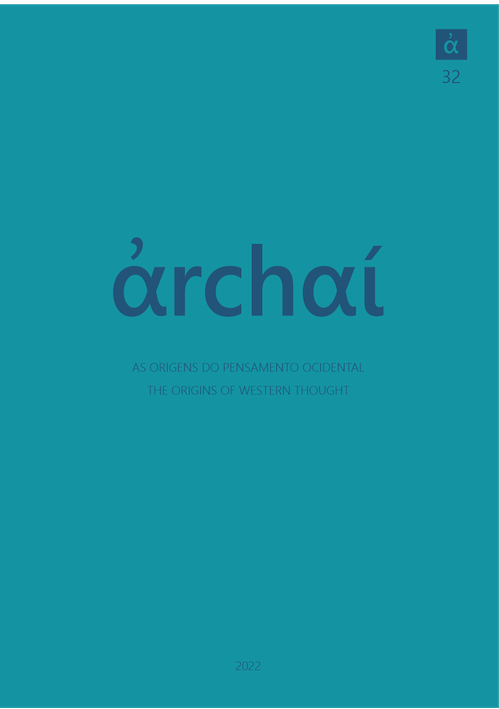Aristotle’s exegesis of Parm. 28B16DK
DOI:
https://doi.org/10.14195/1984-249X_32_18Keywords:
Parmenides, Aristotle, Theophrastus, sensory perception and cognitionAbstract
The starting point for this study is the passage in Metaphysics, in which Aristotle quotes Parmenides’ fr. 28B 16 DK, which is analyzed in the light of other parallel passages within the Corpus Aristotelicum, as well as through the confrontation with Theophrastus’ comment in the De Sensibuson this same Parmenides' fragment, in order to attempt, through an exhaustive lexical and semantic examination, a reconstruction of the interpretation that the Stagirite provided for Parmenides' approach to certain psychic functions (sensory perception and / or cognition). In line with this analysis, we will also try to assess the objectivity of the critique that Aristotle addressed to the philosophical views contained in Parmenides’ poem.
Downloads
References
ÁLVAREZ SALAS, O. D. (2019). Odiseo y el Cíclope: competencia lingüística e identidad cultural. En S. Mohammadi (ed.), Mito, épica e identidad. El pasado como metáfora del presente. Ciudad de México, Universidad Nacional Autónoma de México, p. 41–80.
ÁLVAREZ SALAS, O. D. (2009). La “teoría del flujo” de Heráclito a Epicarmo. En E. Hülsz Piccone (Ed.), Nuevos ensayos sobre Heráclito (Actas del Segundo Symposium Heracliteum). Ciudad de México, Universidad Nacional Autónoma de México, p. 225–260.
BOLLACK, J. (1957). Sur deux fragments de Parménide (4 et 16). Revue des Études Grecques, 70(329/330), p. 56–71.
BOSSI, B. (2010). Parménides, DK 28 B 16: ¿el eslabón perdido? En S. Giombini & F. Marcacci (Eds.), Il quinto secolo. Studi di filosofia antica in onore di Livio Rossetti. Perugia, Aguaplano, p. 45–62.
BREDLOW, L. A. (2011). Aristotle, Theophrastus, and Parmenides’ Theory of Cognition (B 16). Apeiron, 44(3), p. 219–263.
BORDOY, F. C. (2016) Liberar el alma del cuerpo‑prisión: la función de la verdadera filosofía. Archai: Revista de Estudos sobre as Origens do Pensamento Ocidental 17, p. 173-197.
CALVO, T. Aristóteles. (1982). Metafísica (introducción, traducción y notas). Madrid, Gredos.
CHERNISS, H. (1935). Aristotle’s Criticism of Presocratic Philosophy. Baltimore (MD), The John Hopkins University Press [trad. esp. de Loretta Brass de Eggers et alii (1991). La crítica aristotélica a la filosofía presocrática. Ciudad de México, Universidad Nacional Autónoma de México].
CORDERO, N. L. (2015). La aristotelización y platonización de Parménides por Simplicio. Argos 38, p. 32–51.
COXON, A. H. (2009). The Fragments of Parmenides (Vol. 1). Las Vegas, Zurich, Athens, Parmenides Publishing.
DIELS, H. (1897) Parmenides Lehrgedicht: Griechisch und Deutsch. Mit einem Anhang über griechische Thüre und Schlösser, Berlin.
DIELS, H. (1879) Doxographi Graeci, Berolini, G. Reimer.
DIELS, H. & Kranz, W. (1960). Die Fragmente der Vorsokratiker (6a.). Berlin, Weidmannsche Verlagsbuchhandlung.
FRÄNKEL, H. (1946). Man’s “Ephemeros” Nature According to Pindar and Others. Transactions and Proceedings of the American Philological Association, 77, p. 131–145.
LAKS, A. (1990), ‘The More’ and ‘the Full’. On the Reconstruction of Parmenides’ Theory of Sensation in Theophrastus, De sensibus, 3–4. Oxford Studies in Ancient Philosophy, VIII, p. 1–18.
MOURELATOS, A. P. D. (2008). The Route of Parmenides. Las Vegas, Zurich, Athens, Parmenides Publishing.
TARÁN, L. (1965). Parmenides: A Text with Translation, Commentary, and Critical Essays. Princeton, Princeton University Press.
ROSS, D. (ed.) (1924). Aristotle's Metaphysics. Vol. 1. Oxford.
SNELL, B. (2007). El descubrimiento del espíritu. Barcelona, Acantilado.
UNTERSTEINER, M. (1958), Parmenide. Testimonianze e Frammenti. Milano, La “Nuova Italia” Editrice Firenza.
Downloads
Published
How to Cite
Issue
Section
License
Copyright (c) 2022 Nazyheli Aguirre De la Luz

This work is licensed under a Creative Commons Attribution 4.0 International License.
Given the public access policy of the journal, the use of the published texts is free, with the obligation of recognizing the original authorship and the first publication in this journal. The authors of the published contributions are entirely and exclusively responsible for their contents.
1. The authors authorize the publication of the article in this journal.
2. The authors guarantee that the contribution is original, and take full responsibility for its content in case of impugnation by third parties.
3. The authors guarantee that the contribution is not under evaluation in another journal.
4. The authors keep the copyright and convey to the journal the right of first publication, the work being licensed under a Creative Commons Attribution License-BY.
5. The authors are allowed and stimulated to publicize and distribute their work on-line after the publication in the journal.
6. The authors of the approved works authorize the journal to distribute their content, after publication, for reproduction in content indexes, virtual libraries and similars.
7. The editors reserve the right to make adjustments to the text and to adequate the article to the editorial rules of the journal.



